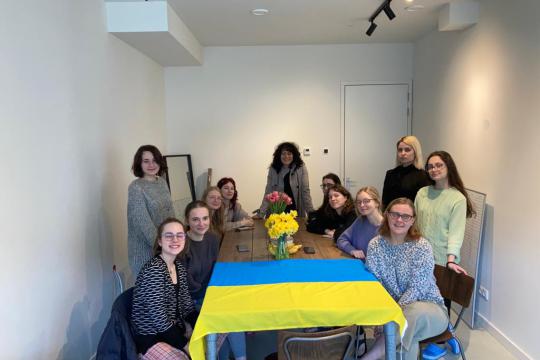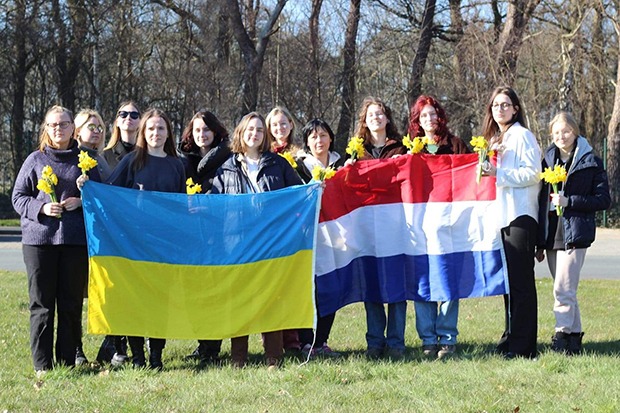When Kosenok woke up to strange sounds at the crack of dawn on February the 24th, she assumed the workers building a house near hers had just started early. But she kept waking up, and decided to check her phone. After two hours of scrolling through vague reports of explosions near Kyiv, an article in capital letters told her Putin had started a war with Ukraine. She woke her mother and sister, they packed their bags and awaited more information.
“It was unclear what we were supposed to do so we just stayed home and read the news. For days.” They eventually went to seek shelter in a metro station but there were so many people there and the temperature was so high, Kosenok thought it would be a lot harder there than above ground.
Back home, a feeling of apathy came over her. “We quickly got used to there being a war. We didn’t really experience stress, we just didn’t feel anything. There were already too many volunteers and not enough weapons or material to store donated blood so all I did was just sit on my bed and read the news.”
The new group of ten students that just arrived are staying in a hotel paid for by Wawoe and the other people that picked them up, but are looking for a more permanent place to stay. A group of VU students is helping them in their search. Anyone that wants to house a student or provide free accommodation can email help.ukrainianstudentsvu@gmail.com
‘Nonsense from the West’
She did so until March 4th, when a letter from her university came. It addressed all students from the Psychology department and offered them the opportunity to enrol for a course at VU Amsterdam, given by professor Kilian Wawoe. He had been a guest lecturer at the Taras Shevchenko National University in Kyiv since 2013, and had stayed in close contact with the vice dean after he had left for the Netherlands two weeks prior to the invasion.
When he left Kyiv, no one there believed an actual war would break out. “They called it nonsense from the West”, he says. But the threat levels rose steadily, and when KLM Royal Dutch Airlines stopped flying to Kyiv, Wawoe decided to head back to the Netherlands. “Even then, hardly anyone considered leaving. It was only the elderly or people with children who considered a plan B.”
Mental breakdown
The vice dean would call with Wawoe frequently from a bomb shelter – sounds of them dropping in the background. Together they set up a plan to get Ukrainian students to Amsterdam. Wawoe: “I have two children myself, I felt very responsible.”
Kosenok didn’t immediately connect the letter to the war. “I just thought: Cool – why not, I’ve never been to Amsterdam. It wasn’t until later that I found out this was Kilian’s plan to help us get to a safe place.”
All Kosenok was told was that she had to meet up with the other students in Lviv, a city close to Poland from where a lot of refugees cross the border. She only brought some clothes and a toothbrush, since the trains are so packed from Kyiv that they hardly let people take anything. “I didn’t even know if I would make it to Lviv in two days. The question isn’t if you’ll be able to sit on the train. It’s if you’ll be able to get on at all.”
‘It wasn’t until later that I found out this was Kilian’s plan to help us get to a safe place’
Eventually, she got to Lviv a day early. What ensued was a nerve-wracking ordeal. She called every hotel and hostel around, but no one had room. “There were so many people in the train station. It was very cold and I felt like I was close to a mental breakdown. When I started crying a lady came over and told me of a group of volunteers. I had to go to a village near Lviv to meet up with them. I didn’t know who would be there, but I was so tired I decided to go.” There, she ended up sleeping in a church with other refugees.
Meanwhile, Wawoe was underway with three others and two buses to pick up the girls. Besides the ten students that enrolled in his course, they had decided to also take a Ukrainian family and their dog back, as well as one of the student’s twin sisters, with whom the student did not want to leave without. They awaited the group in a hotel in the Polish city of Kraków, after having driven from Amsterdam in one go. Kosenok met up with the other students – most of which she didn’t know yet – and they crossed the border together. “There were so many people queueing that you couldn’t get to the border by car. Luckily we only walked for about forty minutes before a taxi brought us to Kraków.”
Luxury student dorm
When they got to the hotel that morning, they only had time to eat a piece of the “best cheesecake ever”, but were told by Kilian and the drivers they wanted to leave as soon as possible to not have to drive through the night. Wawoe: “That wouldn’t be safe, we wanted to avoid the drivers getting tired and having something happen.” They drove to Amsterdam in two days with a stopover at a hotel in Germany: “A hot shower for the first time in days”.
There, they had one day to get settled in the office building one of Wawoe’s acquaintances had transformed to a living area before joining the solidarity meeting organized by VU Amsterdam the next day.

The Ukrainian students in their Amsterdam home with deputy mayor Touria Meliani, who took them to Rijksmuseum
Kosenok: “By Ukrainian standards, our building is a luxury dorm. Kilians friend buys us food every day. We have sim cards for our phones, we’re offered a counsellor for mental support. We cook food, the girls are nice – though we don’t always agree with each other – it’s good, it’s comfortable.” When they are not meeting with the VU to organize their study programmes, Kosenok tries to find her way in the city (“your metro lines are so confusing, but I’m not in the position to complain”), takes in the culture shock (“you have so many bikes here”) and finds joy in little things like going to KFC (“it had been closed in Kyiv for a while”).
Struggling to find their place
Back in Kyiv, Kosenok was almost finished with her bachelor’s in Clinical Psychology. She had planned to do a Master’s programme in Cognitive Behavioral Psychology. The plan still stands, but she’s uncertain where she will end up after. “If the war continues, I won’t be able to go back to the university. But I don’t think this will go on for two or three years.” All students that were brought here, can finish their study programme at VU. According to VU spokesperson Frauke van Goethem they are figuring out a construction for financing the study programmes.
‘You might think twice before you send your daughter to another country with an unknown man’
Wawoe just picked up another group of ten students, including Kosenok’s best friend. Wawoe: “This first group to travel with us was a little hesitant at first. You might think twice before you send your daughter to another country with an unknown man. That’s also why we made sure to not only have male drivers, and we brought a translator with us. Now the applications are going through the roof.”
The plan is that at some point, others will take over. For now, Wawoe is plenty busy helping the group register in the city, bringing them in contact with student councillors to figure out their study path and making sure they have what they need in their day to day life. “They get offered anything you could think of, from EMDR therapy to yoga to pairs of shoes. What troubles me more is seeing the family with two kids struggle to find their place. They don’t speak English and have to find a school for the kids. The students will be taken care of by the system of the university, but the family is just sitting there in their apartment.”
Coping mechanism
It wasn’t necessarily a hard decision for Kosenok to leave Kyiv and her family behind. “I trust that they are safe. I don’t think they’ll bomb the capitol as hard as Marioepol but if they do, we have plenty of shelters and a good alarm system. They still have electricity so we can stay in touch easily. In other parts where there’s no electricity anymore, sometimes you don’t know if someone’s phone died or they’re not alive anymore.”
She laughs wryly while saying this. Isn’t she afraid her feeling of apathy towards these haunting experiences will at some point flip and turn into distress? “It may be a way for me to cope with everything. But I have a roof over my head, a chance to study, my family is safe… you don’t want to keep thinking about whether or not you or your family might die. Before the war you have an image of you becoming depressed and sad, but we’re also just leading a normal life. You adapt.”
